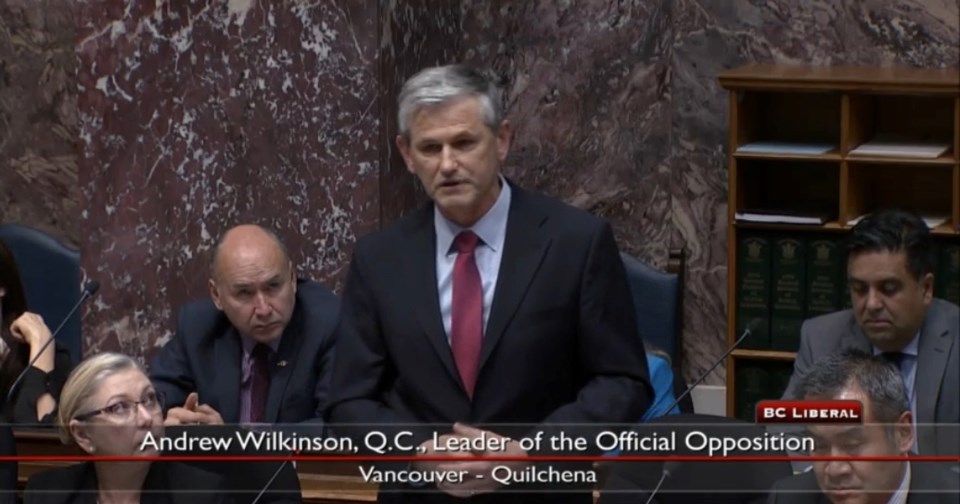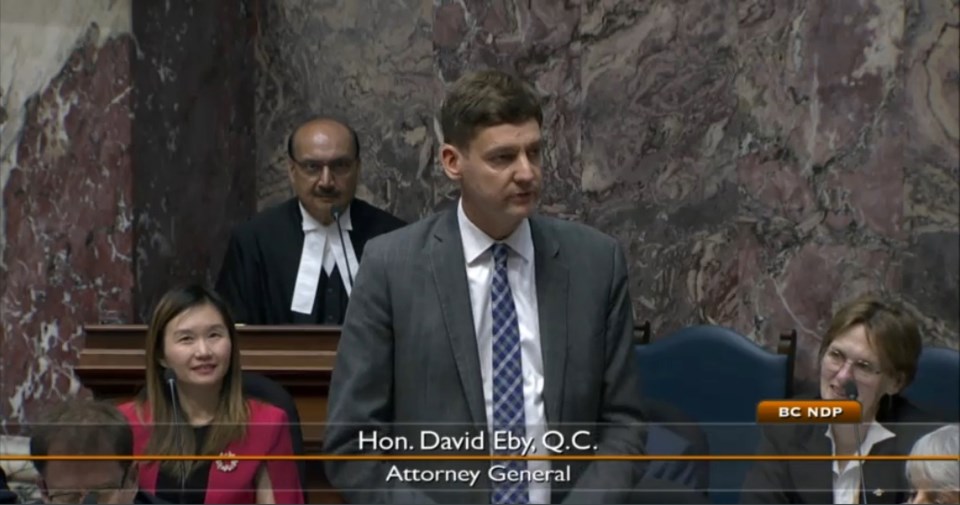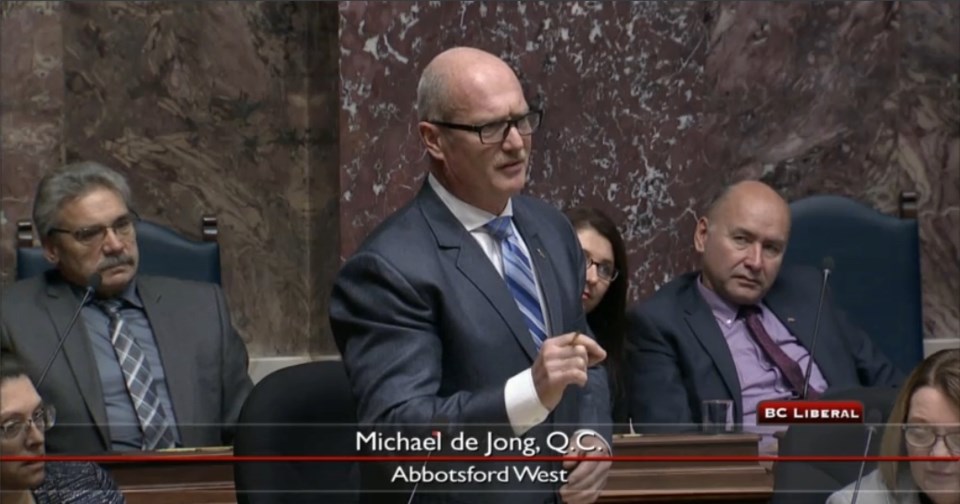Last week, the British Columbia Supreme Court ruled that Attorney General David Eby acted outside his authority when he imposed restrictions on the number of medical expert reports that can be used in auto insurance court claims.
The ruling, which set aside those limitations, represents a hurdle for the B.C. government — the change had been touted as a way to save more than $400 million a year at the Insurance Corp. of B.C., which lost $1.15 billion in the last financial year.
Since it came down, politicians in the legislature have been trading barbs about who is to blame for the “financial dumpster fire” — Eby’s words — at ICBC.
Here, we take a look at one of those legislature exchanges, and provide a bit of background and context. Our annotations are in italics. The full transcript and video can be found here.
For more on the challenges facing ICBC, go to timescolonist.com/more.
The speakers
A. Wilkinson — Andrew Wilkinson, leader of the B.C. Liberal Party
Hon. D. Eby — Attorney General David Eby. The role of the attorney general is to “administer justice, deliver public safety services and programs, lead emergency management and provide legal advice to government.” Part of his mandate was to “conduct a thorough review of ICBC.” He is also the minister responsible for ICBC.
Mr. Speaker — Speaker Darryl Plecas. Plecas was elected as a Liberal, but was kicked out of the caucus when he agreed to become Speaker. He now sits as an Independent.
M. de Jong — Liberal MLA Mike de Jong, the former finance minister
Hansard transcript, B.C. legislature debate, Oct. 24, 2019, afternoon sitting
COURT RULING ON EVIDENCE RULES IN ICBC CASES AND IMPACT ON REVENUES

A. Wilkinson: Not long ago the Attorney General stated to the people of British Columbia that he would save motorists $400 million a year with a quickie change to the rules of court. Well, the only problem is that he somehow didn't notice that the courts determine the rules of court.
In February, the B.C. government announced it would limit the number of “adversarial experts” who can testify in personal injury claims, an attempt to stem the $1-billion-a-year losses at the Insurance Corp. of B.C.
Today the Chief Justice of the Supreme Court of British Columbia, Mr. Justice Hinkson, made it crystal-clear that the Attorney General had no clue what he was doing and slapped down his effort to control costs at ICBC. His scheme is dead in the water to the tune of $400 million that the Finance Minister now has to deal with. And who pays? Every single driver in British Columbia.
On Oct. 24, B.C.’s Supreme Court overturned new rules intended to limit the use of experts in automobile insurance lawsuits.
The judgment by Chief Justice Christopher Hinkson ruled that the government’s limit of three expert reports was unconstitutional because it violated the exclusive powers of a court’s control over its processes.
When is the Premier going to realize that his Attorney General's scheme is falling apart and he better figure out a new plan and find a new Attorney General?
Hon. D. Eby: It's, obviously, a difficult day receiving the decision from the B.C. Supreme Court. We're still studying it.
When he introduced the changes, Eby said the government hoped the reforms to the B.C. Supreme Court Civil Rules Regulation would save “in excess of $400 million” by encouraging earlier settlements and reducing costs of settling vehicle injury claims.
But we went forward with a basic principle, which is that the amount of money that people spend to get a decision from the court should be proportionate to the award itself. It's not something that we just came up with. In 2006, the Leader of the Opposition will remember Allan Seckel. He and the then chief justice worked on a civil reform justice group and said exactly that.
Now, I've been waiting….
Interjections.
Mr. Speaker: Members.
Hon. D. Eby: The members are shouting about committees. I appreciate it.
I've been sitting here waiting for 2 1/2 years for a question on ICBC from the opposition. So while it's a difficult day in the court decision, I'm glad to stand and remind British Columbians…
Interjections.
Mr. Speaker: Members.
Hon. D. Eby: …of what the Fraser Institute said about the previous government [PDF]. "Faced with exploding costs, the previous B.C. government had a choice: contain the costs, take the unpopular decision to increase rates substantially or enact large-scale reform of the basic auto insurance system in the province. In the end, the government chose to do nothing."
Mr. Speaker: The Leader of the Official Opposition on a supplemental.
Interjections.
Mr. Speaker: Members. Members, the Leader of the Official Opposition has the floor.
A. Wilkinson: Well, we've got quite a track record emerging here from this Attorney General, who reports to be the person who runs the legal system in British Columbia. August 29, 2017, in Federal Court: "British Columbia does not appear to understand the basic ground rules of the complex proceeding it is seeking to enter."
The province was rebuked on Aug. 29 for its filing in the legal challenge against the Trans Mountain pipeline expansion; however, B.C. was still granted the intervenor status it sought.
February 22, 2019 — case kicked out of the Alberta courts because the claim is struck.
Eby had challenged Alberta’s “Turn Off The Taps” legislation, which supposedly gave Alberta authority to cut off oil and gas shipments to B.C. as punishment for the B.C. government’s opposition to the expanded pipeline. The challenge was dismissed in February, but only temporarily — B.C. was allowed to refile the day after law came into force in April.
May 24, 2019 — lost 5-nothing in the Court of Appeal in the Trans Mountain case.
On May 24, the British Columbia Court of Appeal rejected the province’s bid to restrict increased heavy oil shipments through the province.
Now we have the Chief Justice of the Supreme Court of British Columbia saying the Attorney General hasn't got a clue what he's doing when it comes to managing the rules of court.
This is a bit of a surprise when we're supposed to have a competent Attorney General who's managing ICBC. Instead, we have flagrant incompetence, a continuing losing record and no effort whatsoever to do anything that is actually going to lead to reduced costs for motorists.
This is a total failure by the Attorney General, and it's time the Premier took some accountability on this, because motorists are paying for this, not the Attorney General.

Hon. D. Eby: I'm going to tell the Leader of the Opposition a brief story about a member who didn't have the stones to stand up today to ask a question about ICBC. It was a sunny afternoon in 2015 in Kelowna, a closed hotel boardroom and a lobby group called the ARA, a lobby group for automobile repair….
The member in question is Todd Stone, the Liberal MLA for Kamloops-South Thompson. Stone was the minister of transportation and infrastructure and the minister in charge of ICBC before the 2017 election.
Interjections.
Mr. Speaker: Members. Members, please.
Interjections.
Mr. Speaker: Members, we shall hear the response.
Hon. D. Eby: I'm worried the members know the story I'm going to tell, which is why they don't want me to tell it. In 2015, a closed boardroom in Kelowna….
Interjection.
Hon. D. Eby: It's better than burying reports. I hear the driveway crew out front just dug up one from the former Finance Minister this morning.
This is a reference to former finance minister Mike de Jong.
Interjections.
Mr. Speaker: Members.
Hon. D. Eby: The former minister, who's shouting, literally tore pages out of a report about how to fix ICBC, so I'll take my direction from somewhere else.
Now, in the first part….
A draft of a Dec. 23, 2014, report by consultant Ernst & Young contained seven pages outlining changes that were designed to put ICBC on more stable financial footing. The recommendations were not only ignored by the Liberal government, which commissioned the report, but a final version released publicly on March 16, 2015, was scrubbed to remove all seven pages and relevant recommendations.
The suggestions included caps on soft tissue injury claims in minor accidents, higher insurance for drivers with histories of infractions such as distracted driving, and changes to how government sets ICBC’s capital reserve levels.
Interjections.
Mr. Speaker: Members. Members.
Interjections.
Mr. Speaker: Members, we shall hear the response.
Hon. D. Eby: Thank you, Hon. Speaker.
In the first part of his speech in this closed boardroom to a group who'd donated $30,000 to the previous government, the former minister responsible for ICBC, after he requested a report about how to reduce costs at ICBC, promised them that he would do a review about how to increase the amounts paid to automobile repair shops.
In the second part of his speech, he talked about a repair facility owned by ICBC worth literally millions of dollars. One of the people in the crowd said, "You're going to give it to us?"— as a joke. Everybody laughed, because it was funny.
Obviously, the minister wouldn't give away a multi-million-dollar building from an insurance corporation that was losing money. But in fact, he was. The minister smiled and said: "I am pleased to announce I have directed ICBC to transfer their training facility from their ownership and control to the ownership and control of the ARA." There was an audible gasp in the room.
There should have been a gasp from ratepayers, but they didn't know about it, because there was no press release. There should have been a gasp from the board, but the minister was out on his own. You couldn't legally do it, and he wasn't able to follow through.
The opposition literally tried to give away ICBC property to lobby groups. That is the incompetent management that our province saw to cost $2 billion.
Wilkinson denied Eby's allegation, but video of Stone's speech surfaced. Stone later said there had been discussions, but the deal fell through due to legal difficulties.
Interjections.
Mr. Speaker: Members. Members, please.
A. Wilkinson: Let's bring this back to reality. In Cranbrook, you meet two people: a single mom, whose daughter has a car worth $1,000, and her insurance just went up to $5,300 a year; and another family whose kid's insurance for the car that the parents bought for him went from $2,000 to $7,300. That lies squarely in the lap of this incompetent Attorney General, who has failed the motorists of British Columbia, and he hasn't got any answers except to throw out these historical insults.
ICBC implemented a new rate structure on Sept. 1. Under the new model, the insurer no longer takes into account a new driver’s history, including discounts gained, under a learner’s permit. Rates for many new drivers have gone up as a result.
Premier, when are you going to find a competent Attorney General who knows how to do anything in the courts and knows how to manage ICBC more than throwing around insults?
Hon. D. Eby: I have so many stories to tell. I didn't even finish the first one. In the boardroom, in that very meeting, the former minister responsible was introduced by saying he used to be a board member of ICBC, which he did used to be. He leaned over to the person next to him and said: "That was a dark period in my corporate board experience." Well, it was a dark period for ICBC and for ratepayers, as well, because in the two years the member was on the board, he gave away $1 million in bonuses to just six executives at ICBC.
Interjections.
Hon. D. Eby: What have we done? We eliminated the bonuses. That's action. They didn't do it. We did it.
Eby said last November that the NDP government had reduced the number of executives, along with bonuses in new contracts. However, the number of ICBC employees earning more than $150,000 a year jumped between 2016 and 2019, according to ICBC’s 2019 statement and schedules of financial information, released Monday.
Interjections.
Mr. Speaker: Members.

M. de Jong: The Attorney General embarked upon a scheme to limit the rights of insured drivers in British Columbia, and he told us and he told them that it would save $400 million. Just one problem. One teensy, small problem. The whole thing was unconstitutional. Not my words. The words of the court, at page 43: "unconstitutional and of no force or effect."
So besides being caught trying to violate the constitutional rights of British Columbians, the Attorney and the government now have a $400 million problem. There are only two ways to fix that problem. One is that the rates for those families in Clearwater and Cranbrook are going up even further. Or the second is that the Finance Minister has a $400 million problem in her budget. Which is it?
Hon. D. Eby: Gosh, I wonder how we got here. If only there was some way to know.
Interjections.
Mr. Speaker: Members.
Hon. D. Eby: If only there had been some way to predict.
Interjections.
Mr. Speaker: Members. Members, if we may improve the decorum.
I was thinking this morning, pinching myself, how lucky we are to be here. Of course, the decorum was wonderful. Perhaps we could go at least a few days without behaving badly.
Hon. D. Eby: In 2014, the B.C. government knew that ICBC was in trouble. They commissioned a report to advise them how to fix the problem. The report was released in 2015. Something was missing. Seven pages were missing from the report. Now, when we asked, "Will the opposition release those seven pages?" the member who just asked me this question said: "There are cabinet confidences that need to be respected, unless Mr. Eby's view as Attorney General now is that all cabinet documents are open season. That is interesting…."
This is the Ernst & Young report mentioned earlier.
Interjections.
Mr. Speaker: Members. If the Attorney General may….
Hon. D. Eby: This is upsetting him, and I understand why. It's upsetting.
Interjections.
Mr. Speaker: Members, I'm concerned that we're gobbling up question period time.
Hon. D. Eby: It is upsetting. I want one of those magnets for the back of my car, because I'm upset.
The quote continues: "That is interesting, because he took an oath to the contrary. If Mr. Eby wants to look at a document and respect those confidences, I don't have any problem with that."
So I could look at the seven pages he cut out, but I couldn't tell anybody what they said. Do you know what they said? They said: "ICBC is in trouble. You need to fix the system. If you don't, you're going to be losing a lot of money."
Guess what happened after he buried that report? We lost $2.3 billion because of his decision.
ICBC had losses of $1.15 billion for the fiscal year ended March 31 of this year and $1.32 billion in fiscal 2017-18.
Interjections.
Mr. Speaker: Members.
M. de Jong: Well, there's a remarkable performance. The Attorney stands up and purports to criticize the very principles he's spending taxpayers' money arguing in favour of at the Supreme Court of Canada.
You know what people are actually beginning to notice? Every time this Attorney General steps onto the judicial ice, the other team scores. And they've noticed this: he's full of bravado in the pre-game interviews, but he's got the worst plus-minus record in the entire league.
The rules he sought to impose were his alone. He deliberately didn't involve the rules committee that for decades has been utilized by Attorneys General to ensure that this can be done constitutionally. Now he's got a $400 million problem. I predict that when he stands up in a moment, he won't answer the question that British Columbians need to hear an answer to, and that is this: are drivers going to be paying more, or is the budget going to slip into deficit, or a combination of both? Which is it?
In announcing the changes about experts in ICBC cases, Eby said that he had engaged with the rules committee about the new restrictions. However, he said, “The rules committee did not recommend these changes and was not asked to approve these changes. These changes were a decision made by government.”
Hon. D. Eby: Try to imagine the situation faced by the member for Abbotsford West before the election. ICBC is hemorrhaging money. You don't want to make it an election issue. So what do you do? You claim the sale of the ICBC headquarters that hasn't even been listed for sale yet. You claim the sale of ICBC.com, the URL, for $10 million. You claim the savings for a report you haven't even received yet in order to hide the fact that ICBC is in trouble. A massive enterprise, a huge amount of work, to hide the problem from the electorate.
Now the member stands up and says: "Hey, the step you took wasn't good enough." Well, I'll tell you this: it was a hell of a lot more than they did.
Eby says the potential $10-million URL sale to the Industrial and Commercial Bank of China showed up on a list of savings on ICBC’s financial projections before the 2017 election, even though the transaction was never completed.
Stone, who was the minister with responsibility for ICBC at the time, has said the sale, and that of the ICBC headquarters, were pitched by ICBC officials but vetoed by him.
“It was suggested by ICBC on a long list of potential strategies. … But that’s where it started and ended,” Stone said this week. “There was never a deal on that. Cabinet never authorized a deal on that. There was no revenue booked on that. This is all fiction.”
— With files from the Vancouver Sun and The Canadian Press



